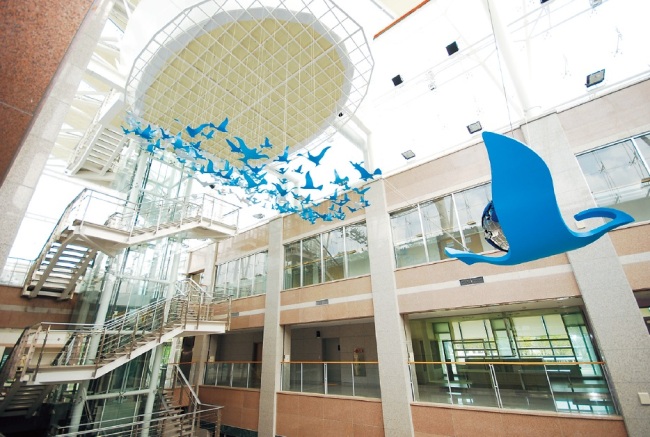[JEJU FORUM] Jeju at the center of peace-building efforts
By Korea HeraldPublished : May 23, 2016 - 19:31
Following the end of the Cold War, then-President Roh Tae-woo invited Soviet Union leader Mikhail Gorbachev for a historic summit in April 1991 on Jejudo Island, seeking to mend fences fraught by decades of ideological and military battles.
The resort island has since been the venue for an array of peace-building efforts, capitalizing on its geopolitical location, natural beauty and tranquil environment.
The resort island has since been the venue for an array of peace-building efforts, capitalizing on its geopolitical location, natural beauty and tranquil environment.

Heads of state and top officials from across the globe have visited the island on various occasions, including Jiang Zemin of China in 1995, Bill Clinton of the U.S. and Ryutaro Hashimoto and Keizo Obuchi of Japan in 1996 and 1999, respectively.
In the wake of the watershed talks between President Kim Dae-jung and North Korea’s late leader Kim Jong-il, several meetings took place between the sides’ special envoys, defense and unification ministers and other senior officials.
During a summit in 2004, President Roh Moo-hyun and Japanese Prime Minister Junichiro Koizumi promoted “shuttle diplomacy” between the two nations’ leaders as a way to boost practical cooperation in a setting that involves minimal delegations and red tape.
“In diplomacy, the location of any events is quite significant, summits in particular -- it could play a role in fostering the overall mood,” a Foreign Ministry official said.
“Away from the capital, the leaders may innately feel more relaxed to talk about pressing issues, especially when there are sources of critical contention between them, as demonstrated through the ‘no-tie’ summit in Sunnylands in 2013 between U.S. President Barack Obama and Chinese President Xi Jinping, as well as the way former U.S. President George W. Bush used his Texas ranch while in office.”
Following Jeju’s lead, other cities like Busan began to host summit-level occasions, widening the range of venues in line with South Korea’s enhanced global footing.
Jeju continues to host a spate of bilateral and international events, with the goal of nurturing the island as a diplomatic hub in East Asia. The central government also designated it as the “Island of World Peace” in 2005.
The island has also launched a multitude of organizations and activities committed to cultivating peace on the Korean Peninsula and throughout the region including the Jeju International Peace Center and its affiliate Jeju Peace Institute.
At the vanguard of the peace-building efforts is the Jeju Forum, which was first held in 2001 as a regional multilateral dialogue aimed at promoting peace and prosperity in East Asia.
Hosted by the self-governing provincial government and Foreign Ministry, the annual forum brings together thousands of policymakers, business leaders, scholars and other experts from around the world participating in more than 60 sessions on issues ranging from Korean unification and nuclear security to climate change and sustainable tourism.
With its focus on peace, Jeju’s potential role has gained traction since President Park Geun-hye unveiled the Northeast Asia Peace and Cooperation Initiative, a long-term confidence-building process among regional stakeholders including North Korea. Her administration has been seeking to foster global partnerships, starting with nonpolitical, unconventional security issues such as climate change, health, nuclear nonproliferation and antiterrorism before progressing to hard security cooperation.
At the Jeju Forum’s eighth edition in 2013, then senior presidential foreign affairs and security secretary Ju Chul-ki reintroduced the Seoul Process, highlighting the importance of cooperation on such common challenges as nuclear security, climate change, cyber terror and disease control among the U.S., China, Japan, Russia and the two Koreas in achieving peace and a joint community.
The conference’s 2007 edition explored the European confidence-building schemes, adopting the Jeju Declaration calling for a model based on the Helsinki process.
“The title ‘Seoul Process’ and its political implications may impose subtle burdens on possible participants like North Korea, so there is a need to consider holding meetings in Jeju, a resort area with less political character, at least during its initial phases,” Chin Haeng-nam, a senior fellow at the Jeju Peace Institute, said in his analysis.
“Separately, as NAPCI makes headway, it should utilize, and ultimately elevate to an intergovernmental meeting, the South Korea-U.N. joint conference on disarmament and nonproliferation issues, which we call the ‘Jeju Process,’ in which specialists from some 10 countries and international organization officials take part every year.”
-
Articles by Korea Herald


![[AtoZ into Korean mind] Humor in Korea: Navigating the line between what's funny and not](http://res.heraldm.com/phpwas/restmb_idxmake.php?idx=644&simg=/content/image/2024/04/22/20240422050642_0.jpg&u=)
![[Exclusive] Korean military set to ban iPhones over 'security' concerns](http://res.heraldm.com/phpwas/restmb_idxmake.php?idx=644&simg=/content/image/2024/04/23/20240423050599_0.jpg&u=20240423183955)



![[Graphic News] 77% of young Koreans still financially dependent](http://res.heraldm.com/phpwas/restmb_idxmake.php?idx=644&simg=/content/image/2024/04/22/20240422050762_0.gif&u=)
![[Herald Interview] Why Toss invited hackers to penetrate its system](http://res.heraldm.com/phpwas/restmb_idxmake.php?idx=644&simg=/content/image/2024/04/22/20240422050569_0.jpg&u=20240422150649)






![[Exclusive] Korean military to ban iPhones over security issues](http://res.heraldm.com/phpwas/restmb_idxmake.php?idx=652&simg=/content/image/2024/04/23/20240423050599_0.jpg&u=20240423183955)



![[Today’s K-pop] Ateez confirms US tour details](http://res.heraldm.com/phpwas/restmb_idxmake.php?idx=642&simg=/content/image/2024/04/23/20240423050700_0.jpg&u=)